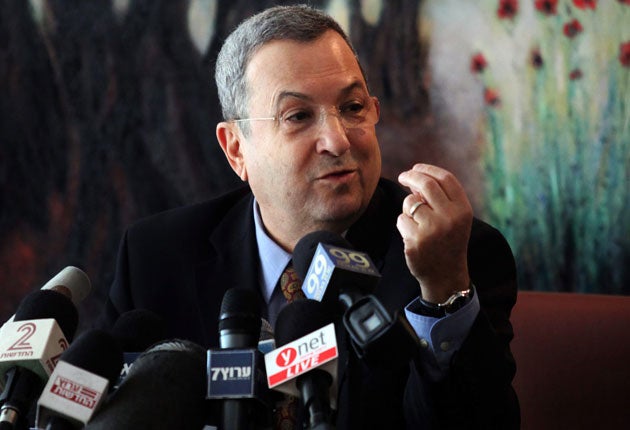Peace process under threat as Barak goes to war with his party

Your support helps us to tell the story
From reproductive rights to climate change to Big Tech, The Independent is on the ground when the story is developing. Whether it's investigating the financials of Elon Musk's pro-Trump PAC or producing our latest documentary, 'The A Word', which shines a light on the American women fighting for reproductive rights, we know how important it is to parse out the facts from the messaging.
At such a critical moment in US history, we need reporters on the ground. Your donation allows us to keep sending journalists to speak to both sides of the story.
The Independent is trusted by Americans across the entire political spectrum. And unlike many other quality news outlets, we choose not to lock Americans out of our reporting and analysis with paywalls. We believe quality journalism should be available to everyone, paid for by those who can afford it.
Your support makes all the difference.Israel's defence minister, Ehud Barak, abruptly quit as leader of the Labour Party yesterday, plunging the party into disarray and casting a shadow over prospects for peace.
The announcement prompted the resignation of three Labour ministers from the government, robbing Prime Minister Benjamin Netanyahu's hawkish coalition of its more moderate voices. Mr Netanyahu is left with a slender majority to govern, but he is now potentially more vulnerable to pressure from the far-right members of his coalition.
Mr Barak, who retains his post in the government, said he was forming a breakaway faction with four other MPs from Labour. The new party, which will remain in the coalition, is called Atzmaut, or Independence, and will be "centrist, Zionist and democratic".
Explaining his decision, Mr Barak said he was frustrated by the party infighting and by "a constant drift to the left and again to the left".
"We are embarking on a new path," he told reporters. "We want to wake up without having to compromise, apologise and explain."
By cutting adrift from his party, Mr Barak avoids a leadership challenge that could have ousted him from government. He was also reluctant to heed calls from within an increasingly divided Labour to leave the coalition in protest at the deadlock in talks with the Palestinians.
But it also means that the governing coalition is now dominated by parties that largely oppose granting major concessions to the Palestinians. Negotiations broke down last September over Mr Netanyahu's refusal to extend a moratorium on new settlements in the occupied West Bank.
Matan Vilnai, one of the four other MPs to defect, insisted that it gave the coalition more breathing space. The government could finally work towards peace with the Palestinians "without a stopwatch", he said.
Mr Netanyahu immediately hailed his defence minister's strategic move, saying it "greatly strengthened" the government.
The split had apparently been worked out in advance with the premier, who had become noticeably more exasperated with criticism from Labour ministers. In the backroom deal, Mr Netanyahu agreed that Mr Barak and two senior party members would retain their ministerial posts in return for a "stable majority" of 66 seats in the 120-member Knesset, according to Israel's army radio. "The split will create an island of stability, a small and consolidated group within the coalition," an aide close to the prime minister told the Israeli news site Ynet, echoing analysts' views that it would shore up the government, in the short term at least.
The move also ensures that Mr Netanyahu retains one of his chief hawks on Iran. Mr Barak, a career soldier before entering politics, privately clashed with Israel's military chief last year because the latter objected to proposals to bomb Iranian nuclear sites, the newspaper Haaretz reported last week.
Tsipi Livni, the leader of the opposition Kadima party, used the opportunity to reiterate a call for new elections. "The Netanyahu government lost its legitimacy today and is living off small political manoeuvres," she said.
The news appeared to take Mr Barak's former colleagues by surprise. Within hours, the Social Affairs Minister Isaac Herzog was the first of three Labour ministers to resign from the government. Benjamin Ben-Eliezer and Avishay Braverman followed suit a few hours later. The shifting alliances leave Labour with eight seats.
"The time has come to stop lying to ourselves and leave the government which has brought us to a dead-end and forced upon us Avigdor Lieberman and his party with its unacceptable racist discourse, which threatens our democracy," Mr Herzog said, a reference to the foreign minister who heads the ultra-nationalist Yisrael Beitenu party.
Labour has dominated Israel's political scene more than any other party. It produced leaders including David Ben-Gurion, Israel's first prime minister, and Yitzak Rabin, who was assassinated in 1995, two years after reaching an interim peace deal with the Palestinians. In its heyday, it held nearly 60 seats, but in elections two years ago, it trailed in fourth to secure just 13 seats.
Some date the start of its decline to Mr Barak's short tenure as prime minister, when he failed to deliver an historic peace deal with the late Palestinian leader Yasser Arafat in 2000. A few months later, the Second Intifada broke out, costing thousands of lives and pushing Israel's electorate to the right.
Join our commenting forum
Join thought-provoking conversations, follow other Independent readers and see their replies
Comments